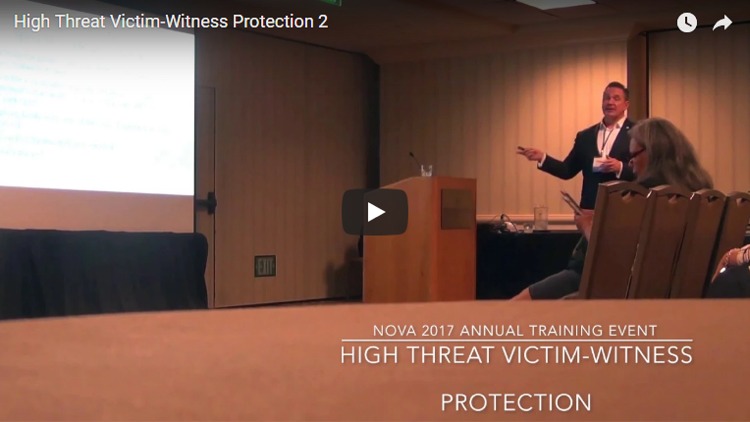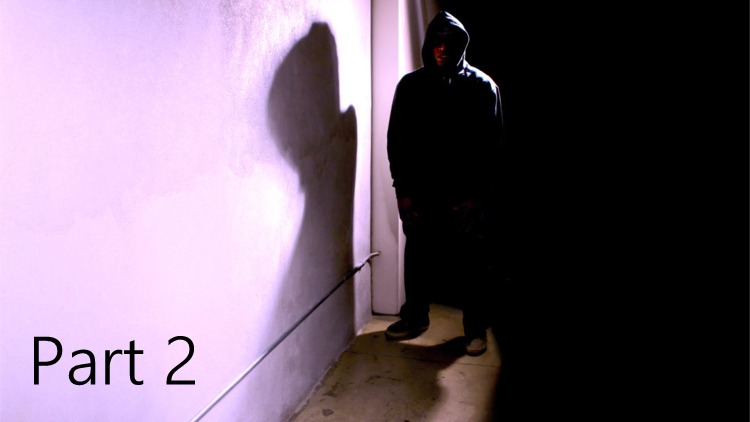“Why Doesn’t She Just Leave?”
 As the Founder & CEO of an organization that provides services to at-risk victims of domestic violence, one of my biggest challenges winning supporters to our cause is the reaction from many among us who simply wonder “why doesn’t she just leave?”
As the Founder & CEO of an organization that provides services to at-risk victims of domestic violence, one of my biggest challenges winning supporters to our cause is the reaction from many among us who simply wonder “why doesn’t she just leave?”
It has often been said the key to knowledge is “knowing the right questions.” And, I admit, at first blush, wondering why she doesn’t “just leave” seems like a reasonable question. However, based upon my work with countless victims of domestic violence, I can assure you that not only is the question misguided, it’s the wrong question.
Let’s start with the word “leave.” If you’re at a restaurant and you don’t like the food or service, you are free to “leave.” If you are on a first date, and you’re not enjoying the company, you are free to “leave.” In fact, absent a prison sentence or commitment to the military, our society pretty much guarantees you the freedom to simply “leave” any unpleasant or unwanted situation you might find yourself in.
Although countless domestic violence victims do simply “leave” their abusers, that seemingly simple act is filled with peril for victims who are connected to dangerous abusers. It’s no coincidence that victims, survivors, and advocates often refer to the act of leaving a dangerous abuser as “escaping.” Remember my prison reference above? It was very purposeful because domestic violence has often been described by victims and survivors alike as a “life sentence,” or a “prison sentence.”
Imagine sharing a prison cell with someone who is bigger, stronger, and more violent than you. Your cell mate was once kind and charming, and your best friend. However, he has slowly over time become controlling, emotionally and financially abusive, and violent. The prison guards are limited in what they can do, and your cell mate threatens to kill you or have your family harmed if you relocate to another cell – and you believe him. Even if you were to relocate to another cell, you’re still stuck in the same prison with him. When you reported the threats and violence in the past, the guards either did nothing, or your cell mate’s punishment was a slap on the wrist. Once, you were charged as the abuser and punished just for defending yourself. To survive, you now “manage” your cell mate by keeping him happy, and the cycle of abuse has slowly become your “new normal.” That, my dear readers, is the reality of domestic violence for far too many women.
So, let’s do a thought experiment and phrase the question more accurately: “Why doesn’t she just ESCAPE?” It certainly has a different ring to it now doesn’t it? It’s definitely not quite the same question we started with, but it is the right question if you sincerely want to know the “why?”
Asking “why doesn’t she just leave” blames the victim, and implies she’s at fault for not casually leaving a dangerous situation as you might simply depart a restaurant you don’t like. But, when we ask the same question in the more proper context of “escape,” the implications are clear: The victim is blameless, and leaving is often dangerous. So, let us instead examine “why doesn’t she just escape?”
“Why Doesn’t She Just Escape?”
According to statistics, 75% of domestic violence related homicides occur upon, or shortly after separating from an abuser, and this risk can persist for up to two years. Simply put, leaving a dangerous abuser can put a victim’s life in grave danger. Victims fear leaving, and the statistics support that their fears are not unfounded.
Many victims have witnessed the judicial system fail others in her position, and the system may have even failed to adequately protect her on prior occasions. With no perceived safe options, victims often choose to “manage” their abusers, and remain in the abusive relationship.
Although Restraining Orders are a critical legal protection, they are rendered nothing more than a “piece of paper” by abusers who are truly committed to violence. Imagine if someone showed up at your home, your place of employment, or even the children’s school (it has happened) intent upon murdering you, and you held up your restraining order to protect yourself. I don’t recommend it.
There are limited and/or unavailable resources to help victims escape. For instance, when PROTECTION FROM ABUSE conducted a direct action rescue mission in Georgia recently, the victim called all surrounding shelters for 4 weeks straight, and they were all full. There are other barriers as well, such as restrictions some shelters impose upon children older than a certain age, and most shelters understandably do not accept family pets who may likewise be at risk of severe abuse.
Domestic violence is as much about control as it is about violence. Most abusers are very skilled at isolating their victims from family and friends over time. Alienated from all those who might help, many victims simply have nowhere to go, and no one to depend upon.
Many abusers do not permit their victims to work, and if they do, they control the money. “Financial abuse” is common in domestic violence relationships. Accordingly, the lack of funds limits a victim’s options to escape.
Having children with an abuser complicates a victim’s escape exponentially. Many victims fear losing and/or sharing custody with a violent and/or vengeful parent. They fear their abuser will harm the children if they escape. Some worry about how divorce or separation will effect the children.
Child custody laws complicate a victim’s escape from a dangerous abuser. Violent abusers rarely lose parental rights, and many victims face limitations imposed by the court regarding relocation which could otherwise improve their safety. Victims are often forced to live in, or near, the very same communities as their abuser. This can literally feel like a “life sentence” for many women as they live in perpetual fear.
The above is not an exhaustive list of the barriers victims face when attempting to escape. Domestic violence is a complex landscape that can also involve physical, emotional, and spiritual barriers to escape. No matter where you stand on the topic of domestic violence, it’s important to understand the short and long-term challenges a victim will face while trying to escape the bondage of abuse.
I hope the next time you are confronted with the topic of domestic violence, that you are now inclined to instead think “how can she escape,” and how might we help her to safety.
© 2017 Steven J. Dana, All Rights Reserved









I lived for a couple of years with a husband that controlled everything. He had not always been controlling but dihething change. We later found our he had a brain tumer. But after he said he was going to kill us. So the next day left with my two boys I had my parents. They didn’t have room for but the made room. The last thing I wanted was to put them in danger. We left with a few clothes would not take the car afraid he might spot it. I got s job. I lived in fear he would go to my parents house take the kids or hurt someone. My story turn out very because he was a sick man. But I didn’t know this. When I left. The point is I was so scared the kids didn’t understand
Why we left. But I think he would have kills us. So I had to take the chance. He did get help for the brain tumer. So I for one know how very hard it was to leave. When I found out how sick he was then I carried so much guilt
My life and my children’s life turn out great. If we had stayed things could been really bad. So when ppl said why doesn’t she leave I understand completely. I pray for you and your babies every night I wish I could come get you and the children and protect you. I have not told this story in s very long time. As strong as you are you will do what you have. It not easy it was the hardest thing I ever did.
Carole, thank you for your courage, and sharing your journey.
I definitely agree, I am a survivor of domestic violence, and there are so many people that don’t realize several victims may be putting their lives and the lives of their children at stake if they decide to leave.
Thanks for your comment Mona. Please share so we can shine a light on this ignorance!
So true.
It truly is escaping. Found myself constantly looking at forests while driving and wondering how I could survive out in the wild if able to get away. I feel very fortunate to be able to be where I am today…. safe.
It sometimes takes a long time to plan and strategize the “escape”, aiming for the least harmful outcome. Weighing all the options, finding the right timeslot, can be very complicated. Having support helps, but not all victims can rely on this. Happy escaping!!
My abuser didn’t let me have more than an allowance and I had to provide a receipt for everything and explain why I bought it. I locked myself in a room, he called 911 after he couldn’t find the gun to say I stole it. The officers talked to us both, left me locked in the room and said keep the peace. The shelter is and has been full for 3 months and I couldn’t leave my dogs for him to take it out on. I got out but I am in a dangerous place but I have no choice unless I leave my fur babies! Please don’t ever ask why I didn’t just leave!
My abuser ( my now ex husband)chalked the car tires to see if I used it while he was gone. He tracked the mileage and times it took to go to the store. If it took longer then he thought it should, I received a call on my cell. I had to explain the holdup. I wasn’t allowed to take my child with me to run errands. I wasn’t allowed to talk on the phone when he was home. My child became used to seeing me black and blue. I finally had him removed from the house by the police. He broke into the basement, tapped my phone lines and listened in. He listened in on a conversation, called me a filthy name over the phone line and broke in to my home. He woke my daughter up…she was from my previous marriage….and held us hostage for hours. He broke everything he could. We finally escaped when he fell asleep. I ran 175 miles to get away from him. I left everyone and everything I had ever known. We made our lives over. We are safe. Restraining orders are only as good as those who enforce them. He was charming and convincing. The police believed his stories of fighting for his family. We are safe now, but I will never be fully the person I was “before” him. I’m in therapy and have PTSD, but I’m alive and we are safe. I’m grateful.